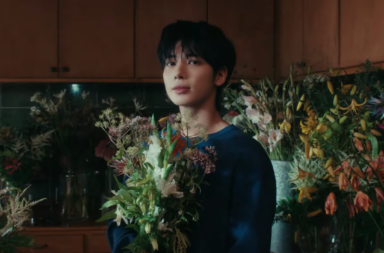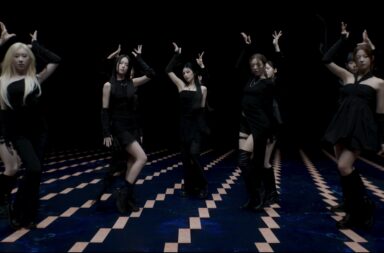
Ha:tfelt is one of the most interesting artists working in K-pop. She has a talent for taking any concept and turning into something rich and complex. She takes simple concepts and adds nuance, takes difficult ones and breaks them down into their rawest, most bare-bones pieces. She is a woman who is seemingly incapable of doing basic, and it is her best quality.
Her latest comeback, “Summertime”, is a shining highlight of Ha:tfelt’s refusal to go the obvious route. Now, the summer song is a tried and true classic, one that is actually difficult to achieve in the simplicity of a quality but not cliche party anthem. In Ha:tfelt’s hands, though, the summer song becomes something layered with double meanings, regret, and a touch of something sinister.
As per her usual, the song and MV for “Summertime” are two halves that, entwined, make the whole meaning of her work apparent, and trying to split them is an effort in futility. There are three types of shots in “Summertime”. The first is the present– Ha:tfelt behind the scenes of a photoshoot for this song. These scenes look fairly natural; well-lit and framed but not overly choreographed. It provides a sense of this being a normal working day for her, a polished version of what her working life looks like. Interestingly, the MV opens with her in the makeup chair, listening to a tinny version of “Summertime”. Thus, the audience is watching her listen to her own song, and her face seems oddly blank.
Then there are the “home movies”. Set at dusk or after night has fallen, with a lower quality to the footage and the black bars of mismatched aspect ratios, these shots are the visualization of the relationship Ha:tfelt is singing about, with the role of her boyfriend played by guest artist Keem Hyoeun. These are poorly lit, neon drenched shots, designed to give the audience a feeling of luridity. It crafts a world of sex, booze, and parties that seems completely out of reach, a world that the ordinary plebian will never get to experience except through these glimpses.
Bridging the gap are the dance shots.. Ha:tfelt and her crew have dance shots in the lighting and styles of both the present and the past, which makes them oddly difficult to characterize. The neon-laced ones seem to be extensions of her memories, a logical expansion of her and her friends hanging out. Yet the present-framed ones have a distinct over-emphasis on white, in clothing, lights, and sets, and paired with a malevolent undercurrent that makes such a leaning on the color of purity seem needed.

This hint of a dark undertone leads us back to “Summertime” as a song. Even sonically, Ha:tfelt eschews the expected. In a time where disco and synth-pop are having A Moment, in a genre where bright and glittery are de rigueur, she went for R&B and lathered it in grime. “Summertime” does have some tropical influences and some light synths, but its buried underneath the deep bass and heady beat, resulting in a song that is seedy, but honest about its own low places and dark temptations, all with a melancholy tone just out of reach.
That melancholy is embodied by Ha:tfelt herself. Her lower tone and rougher edges are utilized perfectly, letting her honesty give the needed gravitas. “Summertime”, you see, is not about the immortal feelings a summer fling provides, but reminiscing on those feelings and mourning their absence. As she sings about the passionate whirlwind of yesteryear’s romance, she longs to feel it again, even though she clearly has the self-awareness to know things like that never last. It throws into doubt what she actually wants– the guy, the head trip, or the songwriting material.

Because that is the sinister undertone that runs all through “Summertime”: the sense of being used. The image Ha:tfelt paints of herself is someone smart and savvy– too smart and savvy to ever think her summer fun could lead anywhere serious. In the dance shots, she and her dancers always have the air of knowing something the audience does not; either that she is stringing along her ex or that we have fallen for her tale of regret and lost love amongst the chaos of summer. The closing shot, though, is what cinches it. The song ends, the aspect ratio expands to match Ha:tfelt’s present and she gives a slow smirk. Not a regretful smile, or sense of satisfaction in her memories, but a look of smugness and arrogance that screams of a plan working out the way she wanted. She had some fun, but more importantly, gained material for a new song, and turned into something magnificent, with no regard for the consequences of her callousness.
Ha:tfelt’s “Summertime” turns every expectation of a summer song on it’s head. Lost loves over new loves. Dark and sultry over bright and danceable. Manipulation over innocence. And by playing on those expectations and thoroughly inverting them, she has created a dark mirror to a K-pop staple, and it is glorious.
(Images via Amoeba Culture, YouTube)


